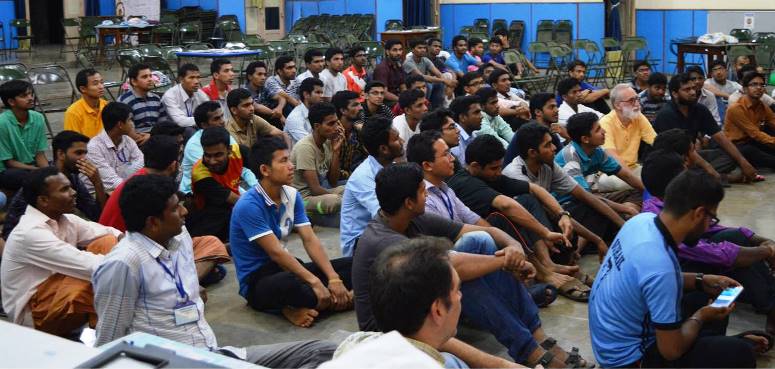
Nov 19, 2016 | Non categorizzato
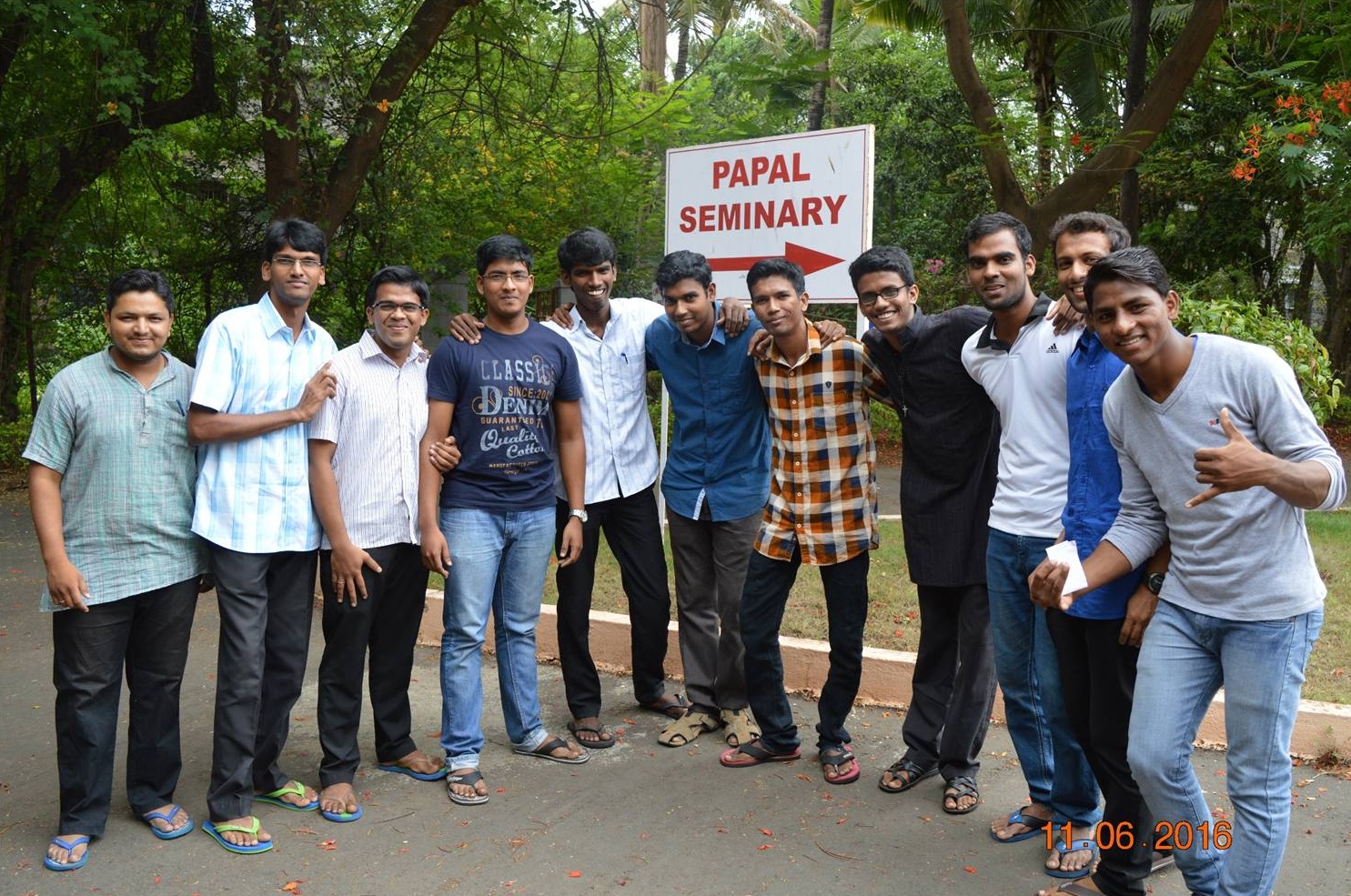 “I learned to be open and not to sweep the dust under the rug,” remarked one seminarians who had attended the workshop on group dynamics based on the Focolare’s spirituality of unity. “I realized that I have to think positive in all that I do,” said another one with great enthusiasm. The spirit of these young men is striking. It is also surprising that in India – a land with thousands of rites and divinities, a land of Hinduism and Buddhism – there should a Catholic seminary with so many young men. The Focolare’s relationship with the Pontifical Seminary of India goes back to 1980. Since then, focolarini on various occasions have been invited to present their spirituality to the seminarians. Many of those seminarians who moved on to become priests and bishops continued to promote the communitarian dimension of the Christian message, which is not always easy to do in their pastoral ministry. In 2016 they asked the Movement for a three-day workshop on group dynamics. It was the first time that the focolarini in Mumbai were faced with such a project, but they accepted the challenge. With a team of 12 men, women, experts from the fields of psychology and relationship, they got to work at putting together a programme for seminarians. It was a demanding task, because of the diversity of cultures among the seminarians who came from all over India, and also because of their different courses of study: from high school to philosophy and theology. The goal of the workshop was to provide the seminarians the tools they could use to help create a community. They had been asked to draw on those elements of Focolare spirituality that have to do with interpersonal relationships: “making ourselves one” with the other; deep listening; the pact of mutual love; sharing experiences of living the Word; giving priority to relationships. These tools were presented from the point of view of psychology and interpersonal relationships through a mixture of brief reports, roll play, testimonies of lay people and clergy and applying the tools to their own lives.
“I learned to be open and not to sweep the dust under the rug,” remarked one seminarians who had attended the workshop on group dynamics based on the Focolare’s spirituality of unity. “I realized that I have to think positive in all that I do,” said another one with great enthusiasm. The spirit of these young men is striking. It is also surprising that in India – a land with thousands of rites and divinities, a land of Hinduism and Buddhism – there should a Catholic seminary with so many young men. The Focolare’s relationship with the Pontifical Seminary of India goes back to 1980. Since then, focolarini on various occasions have been invited to present their spirituality to the seminarians. Many of those seminarians who moved on to become priests and bishops continued to promote the communitarian dimension of the Christian message, which is not always easy to do in their pastoral ministry. In 2016 they asked the Movement for a three-day workshop on group dynamics. It was the first time that the focolarini in Mumbai were faced with such a project, but they accepted the challenge. With a team of 12 men, women, experts from the fields of psychology and relationship, they got to work at putting together a programme for seminarians. It was a demanding task, because of the diversity of cultures among the seminarians who came from all over India, and also because of their different courses of study: from high school to philosophy and theology. The goal of the workshop was to provide the seminarians the tools they could use to help create a community. They had been asked to draw on those elements of Focolare spirituality that have to do with interpersonal relationships: “making ourselves one” with the other; deep listening; the pact of mutual love; sharing experiences of living the Word; giving priority to relationships. These tools were presented from the point of view of psychology and interpersonal relationships through a mixture of brief reports, roll play, testimonies of lay people and clergy and applying the tools to their own lives.  Right from the start the workshop was enthusiastically received and supported by the lively participation, which helped to make the passage from “me to us” that the young men were trying to make. Such a process will be very useful to them when they return to work in groups, and when they will be called upon to start up and conduct groups of other people. It will enable them to put into practice that culture of encounter that is so underscored by Pope Francis. Father George called the workshop “an authentic experience of God among the people.” The intuition to translate the spirituality into life, and the ideas into daily life, turned out to be a winning idea. This is confirmed by the abundant feedback that was written by the participants: “I can everything, but under one condition: that I’m always attentive to the others.” “The encouragement to put the Gospel into practice and not only study it, provoked a radical change in my life.” “This workshop has turned out to be a springboard for my vocation and my way of interacting. The other people’s stories were a great lesson for me.” “It was an extremely fruitful experience of training in being communion. New paths have opened before us. It’s a grace to be able to offer the spirituality of unity in the current social context.”
Right from the start the workshop was enthusiastically received and supported by the lively participation, which helped to make the passage from “me to us” that the young men were trying to make. Such a process will be very useful to them when they return to work in groups, and when they will be called upon to start up and conduct groups of other people. It will enable them to put into practice that culture of encounter that is so underscored by Pope Francis. Father George called the workshop “an authentic experience of God among the people.” The intuition to translate the spirituality into life, and the ideas into daily life, turned out to be a winning idea. This is confirmed by the abundant feedback that was written by the participants: “I can everything, but under one condition: that I’m always attentive to the others.” “The encouragement to put the Gospel into practice and not only study it, provoked a radical change in my life.” “This workshop has turned out to be a springboard for my vocation and my way of interacting. The other people’s stories were a great lesson for me.” “It was an extremely fruitful experience of training in being communion. New paths have opened before us. It’s a grace to be able to offer the spirituality of unity in the current social context.”
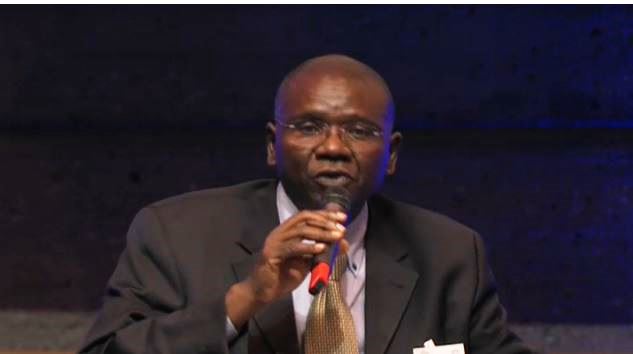
Nov 18, 2016 | Focolare Worldwide
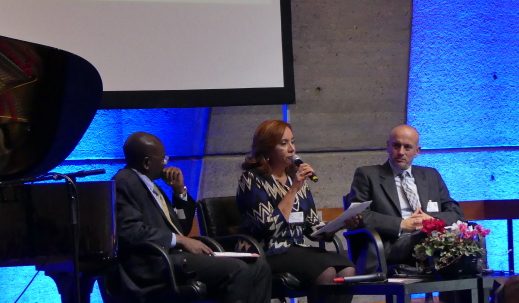 «In a world where globalisation dictates its laws, one of the most important paradoxes we are encountering is that the voice of the southern end of the world is being ignored. Though rich in natural resources like diamonds, gold, oil and other precious minerals, Africa faces: growing poverty and underdevelopment, the worst life expectancy, and a high level of illiteracy, despite the millions of dollars in western aid deposited along the years in various projects. Why? The dramatic response is not only the war we have to suffer, or diseases, but especially corruption which in Africa has become a normal and accepted fact, tearing the continent apart. It is a continent in which the poor have to be corrupt in order to survive, get treated in hospitals, enter one of the “best” professional schools, obtain jobs and get out of jail. Not even the laws are able to eradicate this evil. In most African countries, the law is of western origin, with some nuances taken from local cultures. Protection of the individual alone, for as much as is universally accepted, goes against the principle of the community, most dear to African traditions and that underline the importance of solidarity. The individual is such only if he belongs to a community and acts in function of the community. It is the principle of the “Ubuntu”: I exist because we exist. In the African culture, the Ubuntu is an invitation to support and help each other; it is the awareness of one’s own duties. This how Nelson Mandela put it: Ubuntu means to ask oneself, “Do I want to help the community around me to improve?” It is a rule of life based on respect for others, and a belief in a bond of sharing which unites all of humanity. It is a desire for peace. And yet, precisely in Africa, peace is lacking in many places and the remote cause of the conflicts is absurdly one’s own immense wealth. There are battles to control the minerals and the victims of these conflicts are the weakest people. In the effort to integrate one’s own values with those inherited from colonisation and in the face of the challenges of a world in which economic development gives the right to speak up, Africa is increasingly losing its own values, without acquiring the truly important ones. In my country, Cameroon, which is full of corruption, a small town arose. Chiara Lubich created it by carrying out social
«In a world where globalisation dictates its laws, one of the most important paradoxes we are encountering is that the voice of the southern end of the world is being ignored. Though rich in natural resources like diamonds, gold, oil and other precious minerals, Africa faces: growing poverty and underdevelopment, the worst life expectancy, and a high level of illiteracy, despite the millions of dollars in western aid deposited along the years in various projects. Why? The dramatic response is not only the war we have to suffer, or diseases, but especially corruption which in Africa has become a normal and accepted fact, tearing the continent apart. It is a continent in which the poor have to be corrupt in order to survive, get treated in hospitals, enter one of the “best” professional schools, obtain jobs and get out of jail. Not even the laws are able to eradicate this evil. In most African countries, the law is of western origin, with some nuances taken from local cultures. Protection of the individual alone, for as much as is universally accepted, goes against the principle of the community, most dear to African traditions and that underline the importance of solidarity. The individual is such only if he belongs to a community and acts in function of the community. It is the principle of the “Ubuntu”: I exist because we exist. In the African culture, the Ubuntu is an invitation to support and help each other; it is the awareness of one’s own duties. This how Nelson Mandela put it: Ubuntu means to ask oneself, “Do I want to help the community around me to improve?” It is a rule of life based on respect for others, and a belief in a bond of sharing which unites all of humanity. It is a desire for peace. And yet, precisely in Africa, peace is lacking in many places and the remote cause of the conflicts is absurdly one’s own immense wealth. There are battles to control the minerals and the victims of these conflicts are the weakest people. In the effort to integrate one’s own values with those inherited from colonisation and in the face of the challenges of a world in which economic development gives the right to speak up, Africa is increasingly losing its own values, without acquiring the truly important ones. In my country, Cameroon, which is full of corruption, a small town arose. Chiara Lubich created it by carrying out social  work in favour of the Bangwa people who were at risk of extinction but found salvation instead. But with this work, Chiara above all introduced a new lifestyle, drawing inspiration from the principle of fraternity: giving rise to a coexistence inspired by reciprocity in true justice, which squashes every quarrel, prevents conflicts, and finds solutions to problems also in the families; nobody steals, kills, and the “paths of peace” are pursued. Fraternity can thus become also a lawful principle for coexistence, change relationships in the name of acceptance and inclusion, and translate into solidarity, responsibility and mutual assistance. Peace is expressed today as development, security, universality of human rights, and respect for life: peace is a right, but awaits that lawfulness to be used as its tool. And for this, Declarations and Treaties will not suffice if expressed only in the singular sense, affirming the individual and giving room to interests and conflicts. The “universal” does not mean “absolute,” but “collective”; it is what unites otherwise there will be no relationships between individuals and cultures, or concepts that clash with each other . And if universality enclosed in human dignity allows relationships with each other, fraternity which is the new paradigm, may be the new inspiring principle until it “becomes” also part of the legal system that paves the way for peace. What is born in the heart and translated into coherent attitudes in daily life, will be able to transform relational conflicts into sharing, and ultimately into reciprocity, where what is due is given as a gift to others». Raphaël Takougang
work in favour of the Bangwa people who were at risk of extinction but found salvation instead. But with this work, Chiara above all introduced a new lifestyle, drawing inspiration from the principle of fraternity: giving rise to a coexistence inspired by reciprocity in true justice, which squashes every quarrel, prevents conflicts, and finds solutions to problems also in the families; nobody steals, kills, and the “paths of peace” are pursued. Fraternity can thus become also a lawful principle for coexistence, change relationships in the name of acceptance and inclusion, and translate into solidarity, responsibility and mutual assistance. Peace is expressed today as development, security, universality of human rights, and respect for life: peace is a right, but awaits that lawfulness to be used as its tool. And for this, Declarations and Treaties will not suffice if expressed only in the singular sense, affirming the individual and giving room to interests and conflicts. The “universal” does not mean “absolute,” but “collective”; it is what unites otherwise there will be no relationships between individuals and cultures, or concepts that clash with each other . And if universality enclosed in human dignity allows relationships with each other, fraternity which is the new paradigm, may be the new inspiring principle until it “becomes” also part of the legal system that paves the way for peace. What is born in the heart and translated into coherent attitudes in daily life, will be able to transform relational conflicts into sharing, and ultimately into reciprocity, where what is due is given as a gift to others». Raphaël Takougang
![Jesús Morán. The Unity of Humankind and a Culture of Peace]()
Nov 17, 2016 | Non categorizzato
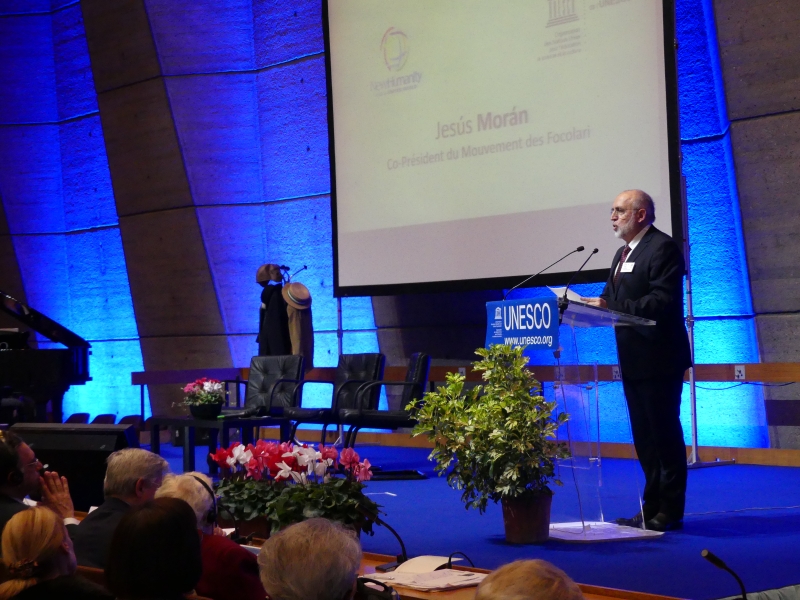
Jesús Morán © Fabio Bertagnin – CSC Audiovisivi
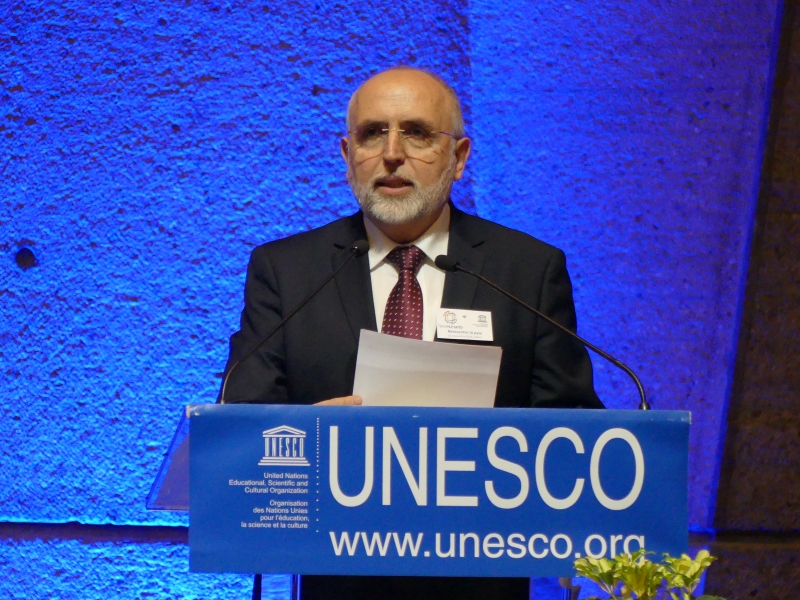
Jesús Morán © Fabio Bertagnin – CSC Audiovisivi
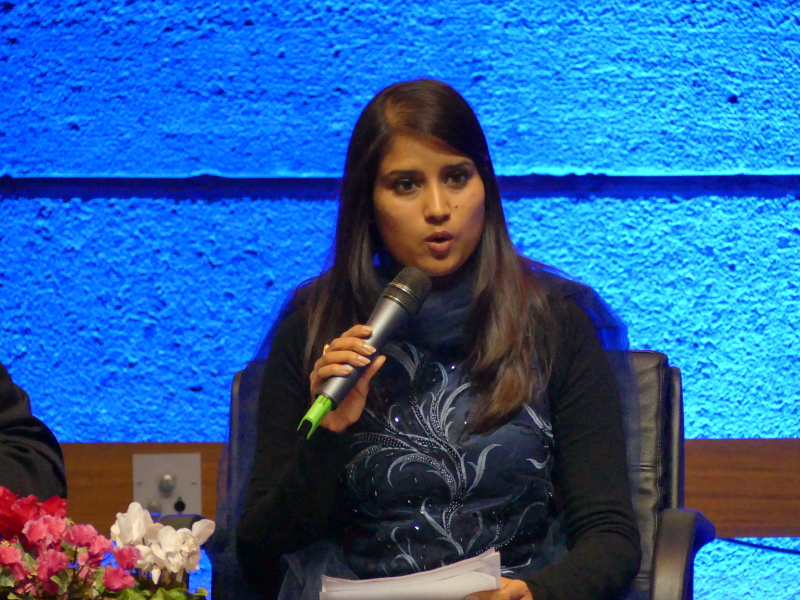
Nov 16, 2016 | Focolare Worldwide

Arooj Javed. Photo © Fabio Bertagnin – CSC Audiovisivi
“Today’s young people aspire to become global citizens and we aspire to a united world,” concluded Arooj Javed, a young student in International Relations, a statement which sums up the objectives of New Humanity.
This celebration of the 20th anniversary of the awarding of the Peace Education Prize to Chiara Lubich was not a nostalgic revisiting of the event. The recent US elections, the tragedy of refugees, climatic change, rising inequality, the greed-dominated markets – all these dramatic happenings, evoked by the various speakers, fully justified the title chosen for the symposium: “Reinventing Peace”. It was to discover – beginning with the Focolare communitarian spirituality – “new solutions” to the “agonizing face of new situations of war”, as expressed by Jesús Morán, the co-President of the Movement. Several catchphrases shed light on these reflections: intercultural laboratories, universal brotherhood, interreligious solidarity, the efforts of co-habitation and, above all, education in dialogue and peace.
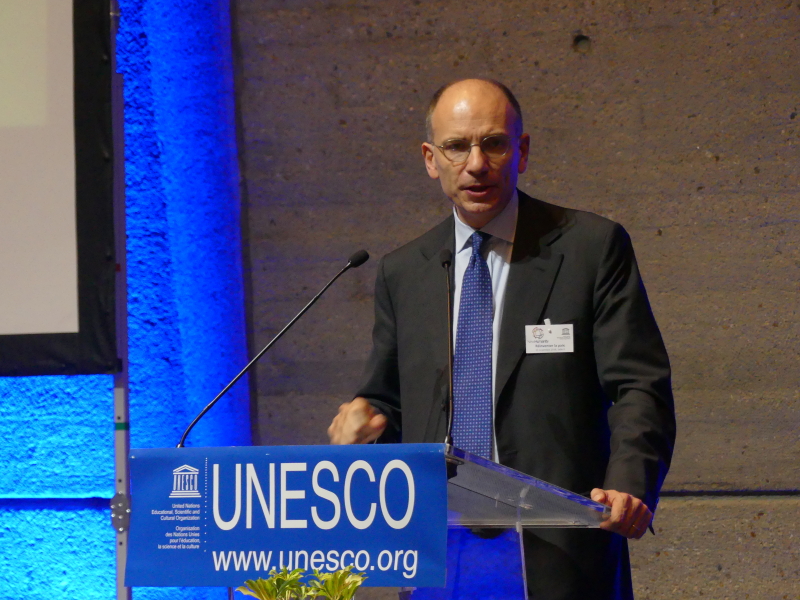
Enrico Letta. Photo © Fabio Bertagnin – CSC Audiovisivi
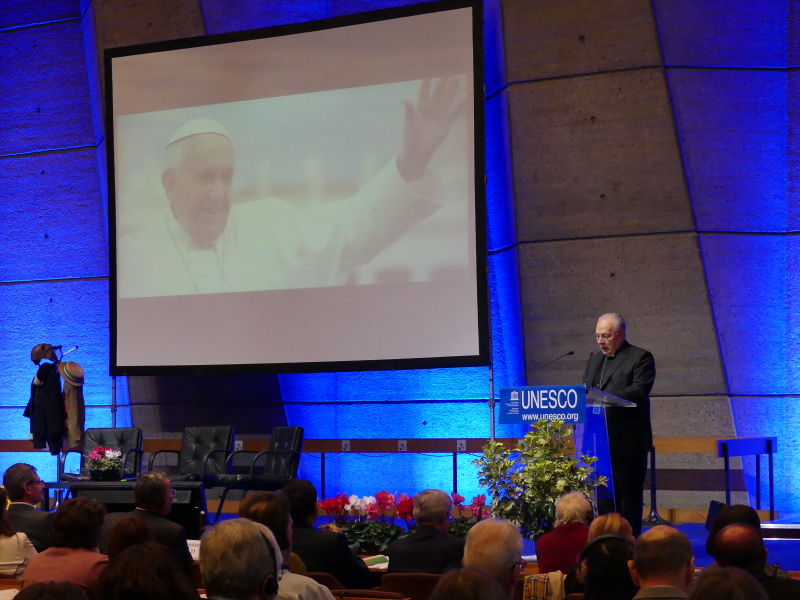
Francesco Follo, permanent observer of the Holy See to UNESCO, Photo © Fabio Bertagnin – CSC Audiovisivi
Chantal Joly (Paris)
Replay web streaming
Nov 15, 2016 | Senza categoria
- Date of Death: 16/11/2016
- Branch of belonging: Member of New Families
- Nation: Italy
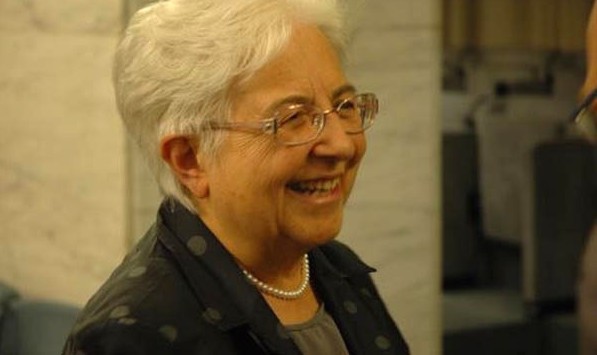
Nov 15, 2016 | Focolare Worldwide, Senza categoria
 “Every day we are presented with images of a world torn by conflicts of all kinds; we see walls being built, migrants and refugees fleeing from poverty and war; and contrasting forms of political self-interest fail to consider the human consequences of their actions.” This was Focolare President Maria Voce’s description of the world scene today, in a talk read on her behalf by Catherine Belzung. This world scene, she recalled, has often been described by Pope Francis as a “piecemeal third world war”. Its violence is unconventional, ubiquitous and pervasive; it is hard to defeat with the tools used up to now. … These conflicts can only be ended through collective commitment, not only on the part of the international community but by the community of all people in the world. No one can consider themselves excluded from this process. It must go through our streets, into our workplaces, our educational establishments, into sports centres and places of entertainment, communication and worship. The response to the “piecemeal world war” is to build world peace “one piece at a time”, through small steps, and concrete gestures. Everyone has a role to play. Everyone is responsible.” Maria Voce emphasised the commitment of international organisations, civil society, associations and movements. She mentioned her own movement which draws on the experience of 70 years of work for unity and peace initiated by Chiara Lubich and taken ahead in the most varied parts of the world in a 360ͦ dialogue, with in the Christian world, with other religions and with people of non-religious beliefs. It is a dialogue “founded on receptivity to people, on a deep understanding of their choices and ideas, appreciating all that is beautiful and positive, all that we might hold in common and that can create bonds. Fraternity can give rise to projects and actions in the complex political, economic, cultural and social fabric of our world. Fraternity Maria Voce affirmed, quoting Chiara Lubich “can give rise to projects and actions in the complex political, economic, cultural and social fabric of our world. Fraternity brings peoples out of their isolation and can offer the opportunity for development to those still excluded from it. It shows us how to resolve differences peacefully and relegates war to history books. Fraternity in action allows us to dream and even to hope for some kind of communion of goods between rich countries and poor countries, given that the scandalous economic inequality in today’s world is one of the main causes of terrorism. The deep need for peace expressed by humanity today shows that living as brothers and sisters is not only a value, not only a method, but is a global paradigm for political development».[1] “On these foundations, Maria Voce continued, it is possible to rethink peace, indeed to reinvent it.” She gave some examples, first of all a profound commitment to dialogue; engaging in projects that are not conditioned by short term or partial interests; breaking down the walls of indifference and acting responsibly to reduce inequality; promoting a culture of legality and caring for creation. Reinventing peace means loving our enemies. … Reinventing peace means forgiveness. Forgiveness is not the opposite of international justice but makes it possible for relationships to start again on a different footing. … This is why work is needed in terms of education and culture. We need to invest in knowledge and learning, as this Institution does … Lastly, reinventing peace means loving other countries as our own, loving other peoples, ethnicities and cultures as our own. Read the full text [1] Message to Prof. Benjamin Barber for the Interdependence Day, Rome, 10th November 2003.
“Every day we are presented with images of a world torn by conflicts of all kinds; we see walls being built, migrants and refugees fleeing from poverty and war; and contrasting forms of political self-interest fail to consider the human consequences of their actions.” This was Focolare President Maria Voce’s description of the world scene today, in a talk read on her behalf by Catherine Belzung. This world scene, she recalled, has often been described by Pope Francis as a “piecemeal third world war”. Its violence is unconventional, ubiquitous and pervasive; it is hard to defeat with the tools used up to now. … These conflicts can only be ended through collective commitment, not only on the part of the international community but by the community of all people in the world. No one can consider themselves excluded from this process. It must go through our streets, into our workplaces, our educational establishments, into sports centres and places of entertainment, communication and worship. The response to the “piecemeal world war” is to build world peace “one piece at a time”, through small steps, and concrete gestures. Everyone has a role to play. Everyone is responsible.” Maria Voce emphasised the commitment of international organisations, civil society, associations and movements. She mentioned her own movement which draws on the experience of 70 years of work for unity and peace initiated by Chiara Lubich and taken ahead in the most varied parts of the world in a 360ͦ dialogue, with in the Christian world, with other religions and with people of non-religious beliefs. It is a dialogue “founded on receptivity to people, on a deep understanding of their choices and ideas, appreciating all that is beautiful and positive, all that we might hold in common and that can create bonds. Fraternity can give rise to projects and actions in the complex political, economic, cultural and social fabric of our world. Fraternity Maria Voce affirmed, quoting Chiara Lubich “can give rise to projects and actions in the complex political, economic, cultural and social fabric of our world. Fraternity brings peoples out of their isolation and can offer the opportunity for development to those still excluded from it. It shows us how to resolve differences peacefully and relegates war to history books. Fraternity in action allows us to dream and even to hope for some kind of communion of goods between rich countries and poor countries, given that the scandalous economic inequality in today’s world is one of the main causes of terrorism. The deep need for peace expressed by humanity today shows that living as brothers and sisters is not only a value, not only a method, but is a global paradigm for political development».[1] “On these foundations, Maria Voce continued, it is possible to rethink peace, indeed to reinvent it.” She gave some examples, first of all a profound commitment to dialogue; engaging in projects that are not conditioned by short term or partial interests; breaking down the walls of indifference and acting responsibly to reduce inequality; promoting a culture of legality and caring for creation. Reinventing peace means loving our enemies. … Reinventing peace means forgiveness. Forgiveness is not the opposite of international justice but makes it possible for relationships to start again on a different footing. … This is why work is needed in terms of education and culture. We need to invest in knowledge and learning, as this Institution does … Lastly, reinventing peace means loving other countries as our own, loving other peoples, ethnicities and cultures as our own. Read the full text [1] Message to Prof. Benjamin Barber for the Interdependence Day, Rome, 10th November 2003.
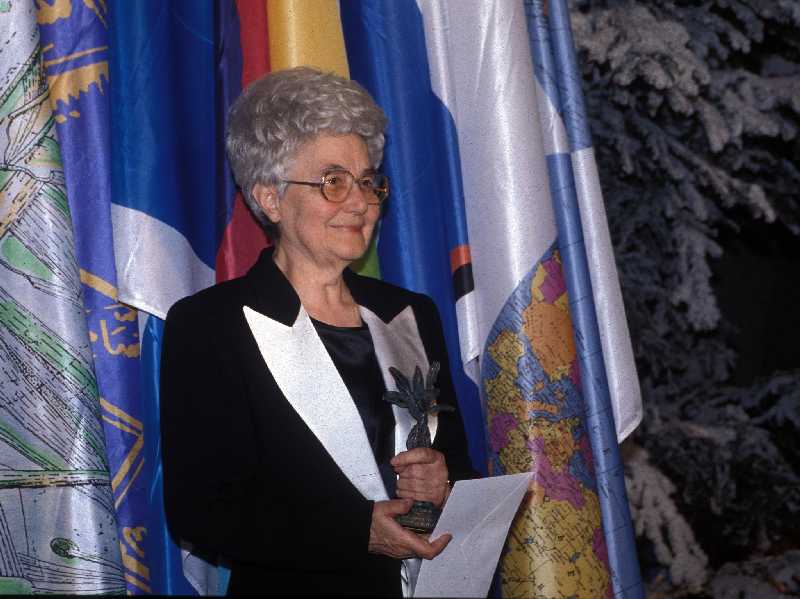
Nov 15, 2016 | Focolare Worldwide, Senza categoria
Live streaming can be followed from 10.00 to 13.00hrs and from 15.00 to 18.00hrs.  The event “Reinventing Peace” will be held at the UNESCO headquarters just two days after the first anniversary of the tragic terrorist attacks that happened in Paris. On the twentieth anniversary of the Prize for Peace Education awarded to Chiara Lubich, the Focolare Movement, in collaboration with the Directorate-General of UNESCO and the Permanent Observer Mission of the Holy See, will give voice to the commitment towards building peace and universal brotherhood lived with determination and creativity in many places all over the world. As Maria Voce, President of the Focolare Movement, said at the United Nations in April 2015, this daily commitment, which involves people of different cultures and religions, “is not limited to tollerance or to just accepting diversity”, but “it goes even beyond reconciliation, and creates, so to say, a new identity, which is broader and more shared. It is dialogue in action, which involves people of different beliefs, even non-religious ones, and urges towards answering to practical needs”. While referring to the actual commitment exercised even in situations affected by serious crises, Maria Voce stated that “it is not the time for half measures. If extreme violence is present, (…) the answer to it should be as radical, but structurally different, which means that one should answer with the extremism of dialogue. This dialogue requires maximum involvement; it is risky, demanding, challenging and aims at eradicating the roots of misunderstanding, fear and resentment”. The programme will be introduced by Marco Desalvo, President of New Humanity (the Focolare Movement NGO at the United Nations) and by a UNESCO Representative. Then, there will a word of welcome by Mons. Francesco Follo, Permanent Observer of the Holy See, followed by a talk from Jesús Morán, the Co-president of the Focolare Movement. This session will be concluded by Maria Voce, who will address the audience about “Reinventing peace”. The second part of the morning session will be interdisciplinary and intergenerational, and it will be enriched by multimedia contents. Concrete evidence in favour of unity and peace will be shared during the five brief panel talks on: Peace is Education; Peace is an Asset; Peace is Right; Peace is Green; Peace is Art. “Dialogue as a remedy for divisions in the world”, the theme for the afternoon session, will focus on key ideas for a new humanism that leads to the unity of the human family. The opening address of this session will be given by Enrico Letta, President of the Jacques Delors Institute, Discussions on two main topics will follow Rita Moussallem, co-director of the Focolare International Centre for Interreligious Dialogue will be the moderator on the panel for the first topic: “Religions: a problem or a resource for peace?”. The speakers will be Adnane Ben Abdelmajid Mokrani, Pontifical Institute for Arabic and Islamic Studies, Italy; Fabio Petito, International Relations at Sussex University, United Kingdom and Léonce Bekemans, economist and specialist of European Studies at “Chaire Jean Monnet”, Italy. The second topic: “Politics and economy in international disorder” will be moderated by Pál Tóth, Sophia University Institute, Italy. Pasquale Ferrara, Ambassador of Italy to Algeria; Silvia Costa, Chairperson of the European Parliament Commission on Culture and Education; and Damien Kattar, former Lebanese Minister of Finance will be the members on the second panel. Source: Press releases (SIF) Brochure: page1 – page 2 Invitation: Unesco Event Read Chiara Lubich’s speech in 1996
The event “Reinventing Peace” will be held at the UNESCO headquarters just two days after the first anniversary of the tragic terrorist attacks that happened in Paris. On the twentieth anniversary of the Prize for Peace Education awarded to Chiara Lubich, the Focolare Movement, in collaboration with the Directorate-General of UNESCO and the Permanent Observer Mission of the Holy See, will give voice to the commitment towards building peace and universal brotherhood lived with determination and creativity in many places all over the world. As Maria Voce, President of the Focolare Movement, said at the United Nations in April 2015, this daily commitment, which involves people of different cultures and religions, “is not limited to tollerance or to just accepting diversity”, but “it goes even beyond reconciliation, and creates, so to say, a new identity, which is broader and more shared. It is dialogue in action, which involves people of different beliefs, even non-religious ones, and urges towards answering to practical needs”. While referring to the actual commitment exercised even in situations affected by serious crises, Maria Voce stated that “it is not the time for half measures. If extreme violence is present, (…) the answer to it should be as radical, but structurally different, which means that one should answer with the extremism of dialogue. This dialogue requires maximum involvement; it is risky, demanding, challenging and aims at eradicating the roots of misunderstanding, fear and resentment”. The programme will be introduced by Marco Desalvo, President of New Humanity (the Focolare Movement NGO at the United Nations) and by a UNESCO Representative. Then, there will a word of welcome by Mons. Francesco Follo, Permanent Observer of the Holy See, followed by a talk from Jesús Morán, the Co-president of the Focolare Movement. This session will be concluded by Maria Voce, who will address the audience about “Reinventing peace”. The second part of the morning session will be interdisciplinary and intergenerational, and it will be enriched by multimedia contents. Concrete evidence in favour of unity and peace will be shared during the five brief panel talks on: Peace is Education; Peace is an Asset; Peace is Right; Peace is Green; Peace is Art. “Dialogue as a remedy for divisions in the world”, the theme for the afternoon session, will focus on key ideas for a new humanism that leads to the unity of the human family. The opening address of this session will be given by Enrico Letta, President of the Jacques Delors Institute, Discussions on two main topics will follow Rita Moussallem, co-director of the Focolare International Centre for Interreligious Dialogue will be the moderator on the panel for the first topic: “Religions: a problem or a resource for peace?”. The speakers will be Adnane Ben Abdelmajid Mokrani, Pontifical Institute for Arabic and Islamic Studies, Italy; Fabio Petito, International Relations at Sussex University, United Kingdom and Léonce Bekemans, economist and specialist of European Studies at “Chaire Jean Monnet”, Italy. The second topic: “Politics and economy in international disorder” will be moderated by Pál Tóth, Sophia University Institute, Italy. Pasquale Ferrara, Ambassador of Italy to Algeria; Silvia Costa, Chairperson of the European Parliament Commission on Culture and Education; and Damien Kattar, former Lebanese Minister of Finance will be the members on the second panel. Source: Press releases (SIF) Brochure: page1 – page 2 Invitation: Unesco Event Read Chiara Lubich’s speech in 1996
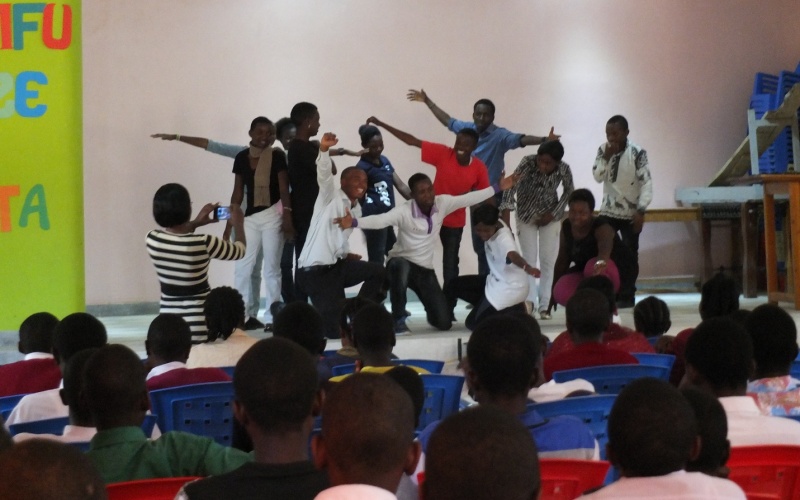
Nov 14, 2016 | Non categorizzato
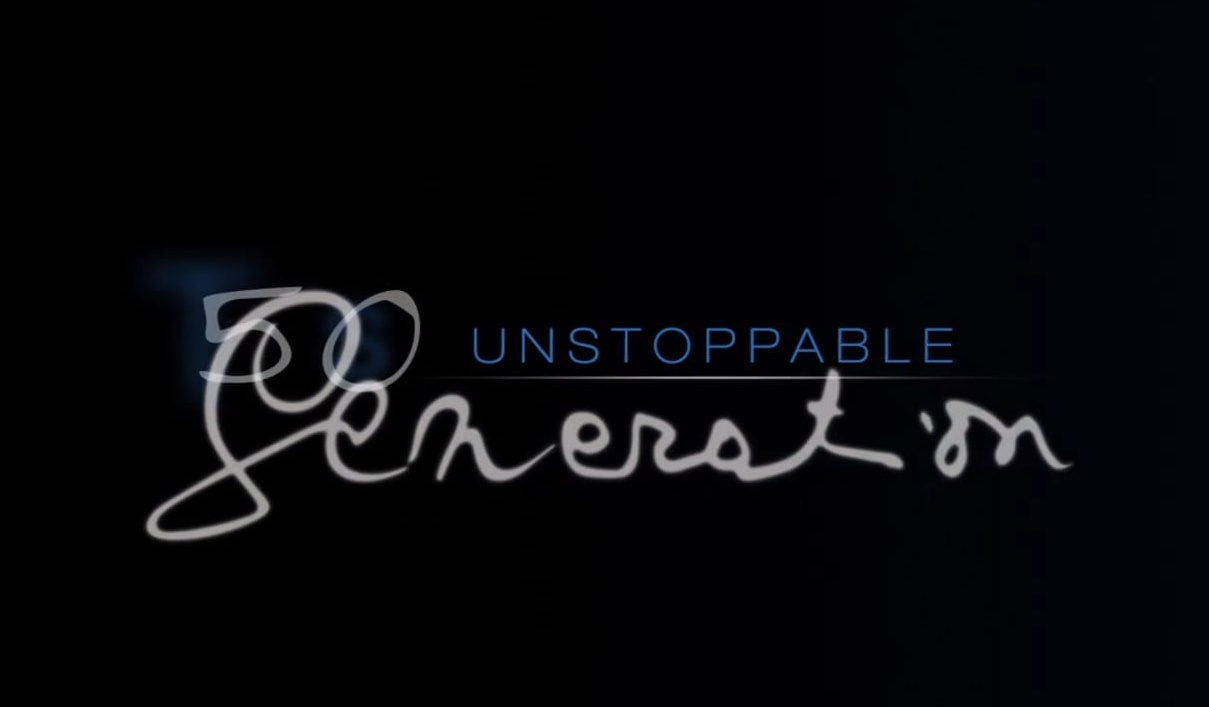 The Gen Movement has been around for fifty years, and still possesses the same freshness and the same ideal as when it first began. The Gen are the new generation of the Focolare. They will be gathering for their congress at Castel Gandolfo on November 17-20, 2016. A thousand young people will attend from all parts of the world. It’s not just any congress this time, but the big celebration of their 50th anniversary. In 1966, Chiara Lubich had appealed to the Focolare’s young people, that they engage the greatest number of their peers in living Jesus’s prayer “that all may be one.” Today, the Gen are everywhere: they belong to different religious faiths, speak many languages and dialects, and show the same enthusiasm and evangelical zeal that they had at the beginning.
The Gen Movement has been around for fifty years, and still possesses the same freshness and the same ideal as when it first began. The Gen are the new generation of the Focolare. They will be gathering for their congress at Castel Gandolfo on November 17-20, 2016. A thousand young people will attend from all parts of the world. It’s not just any congress this time, but the big celebration of their 50th anniversary. In 1966, Chiara Lubich had appealed to the Focolare’s young people, that they engage the greatest number of their peers in living Jesus’s prayer “that all may be one.” Today, the Gen are everywhere: they belong to different religious faiths, speak many languages and dialects, and show the same enthusiasm and evangelical zeal that they had at the beginning.  The first person to be raised to the glory of the altars by living Chiara Lubich’ spirituality of unity, was a Gen – young Chiara Luce Badano. She died in 1990 at the age of 18 and was beatified in 2010. She has become an example of belief in God’s love, both for young people and adults, even amidst illness and suffering. Each year, her feast day is celebrated around the world on October 29th.
The first person to be raised to the glory of the altars by living Chiara Lubich’ spirituality of unity, was a Gen – young Chiara Luce Badano. She died in 1990 at the age of 18 and was beatified in 2010. She has become an example of belief in God’s love, both for young people and adults, even amidst illness and suffering. Each year, her feast day is celebrated around the world on October 29th.  A few weeks ago the Gen held a celebration in Iringa, Tanzania where they presented her as a model of Christian life. They showed a video on Chiara Luce to a hundred young people, which was followed by testimonies and traditional dances. “I learned so much: for example, that I should love whoever is beside me. Here I discovered that it’s possible to be together in love, despite our differences.” “What touches me is Chiara Luce’s patience. She accepted her illness in its entirety, living every moment without complaint.” Despite all obstacles, the Gen forged ahead, for 50 years. They are truly the “Unstoppable generation”! Chiara Favotti
A few weeks ago the Gen held a celebration in Iringa, Tanzania where they presented her as a model of Christian life. They showed a video on Chiara Luce to a hundred young people, which was followed by testimonies and traditional dances. “I learned so much: for example, that I should love whoever is beside me. Here I discovered that it’s possible to be together in love, despite our differences.” “What touches me is Chiara Luce’s patience. She accepted her illness in its entirety, living every moment without complaint.” Despite all obstacles, the Gen forged ahead, for 50 years. They are truly the “Unstoppable generation”! Chiara Favotti
Fragments of history of the Gen Movement https://vimeo.com/191033570 https://vimeo.com/191033565 https://vimeo.com/191033568 https://vimeo.com/191033569 https://vimeo.com/191039964 https://vimeo.com/191033564
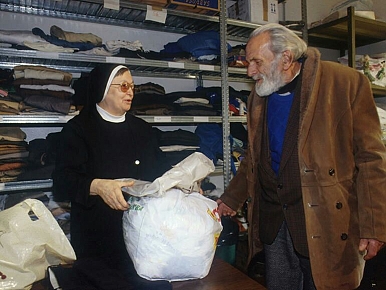
Nov 13, 2016 | Non categorizzato
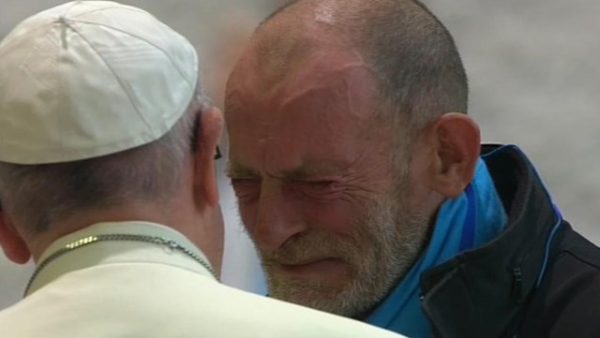 “A Church of the poor means two things mainly: the Church should be poor as Christ was poor, if it wants to proclaim the kingdom of God, if it wants its message to be effective. And all Christians who share in the life of the Church should be poor in spirit. Then the message of salvation would be more easily accepted by the poor; whereas, for the rich it will be difficult to enter the kingdom of Heaven than for a camel to go through the eye of a needle…. This Church of and for the poor should not make us imagine any similar socio-political version of it for the world. (…) When Jesus speaks of the poor, he means those who are being tested, who are humble, who are deprived of reassurance and beyond any real support that they can depend on – yet, they turn to God their just benefactor. The Greek translators of the Bible understood that the poverty of these poor was not merely material deprivation; in fact, they did not translate the Hebrew word anaw (poor), as ‘pauper’ or ‘destitute’ but preferred to use the word praus, which evokes meekness and resignation in the midst of hardship and trial.
“A Church of the poor means two things mainly: the Church should be poor as Christ was poor, if it wants to proclaim the kingdom of God, if it wants its message to be effective. And all Christians who share in the life of the Church should be poor in spirit. Then the message of salvation would be more easily accepted by the poor; whereas, for the rich it will be difficult to enter the kingdom of Heaven than for a camel to go through the eye of a needle…. This Church of and for the poor should not make us imagine any similar socio-political version of it for the world. (…) When Jesus speaks of the poor, he means those who are being tested, who are humble, who are deprived of reassurance and beyond any real support that they can depend on – yet, they turn to God their just benefactor. The Greek translators of the Bible understood that the poverty of these poor was not merely material deprivation; in fact, they did not translate the Hebrew word anaw (poor), as ‘pauper’ or ‘destitute’ but preferred to use the word praus, which evokes meekness and resignation in the midst of hardship and trial.  These poor, according to the Gospel, are also found among the privileged classes. Matthew’s Gospel tells us about Joseph of Arimathea, ‘a wealthy man and disciple of Jesus’ (27:57). He was also detached from his possessions; he was also poor and humble. (…) In his Apologeticum, Tertullian described the Christians of his day as those who did not aspire to or fight for positions in politics, even minor ones, because they were not motivated by personal ambition. On the other hand we find that many, who are economically disadvantaged, turn to messages they receive from outside the Church and support them. (…) This is why the Second Vatican Council invites us to think over our Christian living. Is it genuine? Does it bear the marks of poverty and humility? Poverty should result from love. Love is what will lead us to place our possessions at the disposal of the poor and needy. It is Christian love that banishes egoism and gives birth to communion. (…) Then the Church of the poor becomes the Church of communion between the rich that become poor and the poor that bring their needs, for the building of the Church together. (…) If we want that Church of the poor to return to taking on a role of witnessing in the process of evangelization, it will have to resurface at all levels of Christian life beginning from every point of the Church, from above and from below, from periphery to centre. (…) This will also have a reflection on the social and political level in new reforms that will be fundamentally Christian, if they are inspired by freedom. Some more sensitive spirits are not satisfied and still cry out that the Church must make itself poorer. (…) When someone makes a justified request, even when it is presented in a disorderly or bad manner, it is wise to wonder whether what is being asked might not be a spur to accelerate this process of renewal without which the Good News cannot be brought to all the peoples of the earth in a way that is genuinely helpful. Desiring peace, poverty, communion of goods as the outward signs of a communion of spirits – these are not allegations meant to frighten us: they are what spur us on along the path of the Gospel.” From: Pasquale Foresi, Problematica d’oggi nella Chiesa (Rome: Città Nuova Editrice, 1979).
These poor, according to the Gospel, are also found among the privileged classes. Matthew’s Gospel tells us about Joseph of Arimathea, ‘a wealthy man and disciple of Jesus’ (27:57). He was also detached from his possessions; he was also poor and humble. (…) In his Apologeticum, Tertullian described the Christians of his day as those who did not aspire to or fight for positions in politics, even minor ones, because they were not motivated by personal ambition. On the other hand we find that many, who are economically disadvantaged, turn to messages they receive from outside the Church and support them. (…) This is why the Second Vatican Council invites us to think over our Christian living. Is it genuine? Does it bear the marks of poverty and humility? Poverty should result from love. Love is what will lead us to place our possessions at the disposal of the poor and needy. It is Christian love that banishes egoism and gives birth to communion. (…) Then the Church of the poor becomes the Church of communion between the rich that become poor and the poor that bring their needs, for the building of the Church together. (…) If we want that Church of the poor to return to taking on a role of witnessing in the process of evangelization, it will have to resurface at all levels of Christian life beginning from every point of the Church, from above and from below, from periphery to centre. (…) This will also have a reflection on the social and political level in new reforms that will be fundamentally Christian, if they are inspired by freedom. Some more sensitive spirits are not satisfied and still cry out that the Church must make itself poorer. (…) When someone makes a justified request, even when it is presented in a disorderly or bad manner, it is wise to wonder whether what is being asked might not be a spur to accelerate this process of renewal without which the Good News cannot be brought to all the peoples of the earth in a way that is genuinely helpful. Desiring peace, poverty, communion of goods as the outward signs of a communion of spirits – these are not allegations meant to frighten us: they are what spur us on along the path of the Gospel.” From: Pasquale Foresi, Problematica d’oggi nella Chiesa (Rome: Città Nuova Editrice, 1979).
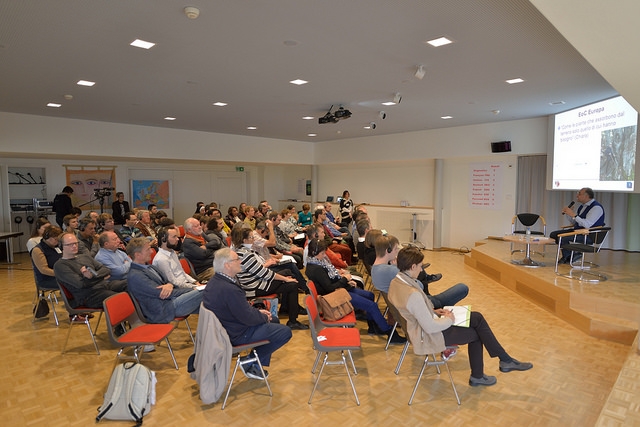
Nov 12, 2016 | Focolare Worldwide
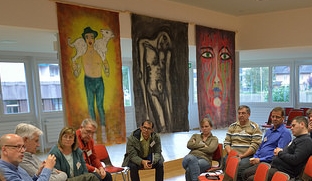
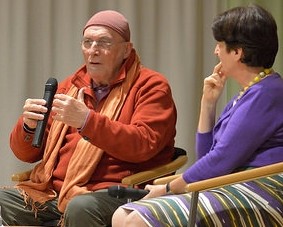 The intense three-day event of communion was attended by about 100 participants from 14 European countries (from Portugal to Russia), among which were pioneer entrepreneurs of the Economy of Communion (EoC), young business men and women, students and economists. The organisers recounted: “The convention opened with the exhibition of French painter, Michel Pochet, on ‘God who is Mercy’ – and his works of art acted as the framework of the entire meeting. The paintings of the ‘Good Shepherd’ and the ‘Good Samaritan’ particularly inspired the entrepreneurs to inculcate in their businesses and work places, the essence of what the paintings conveyed.” Right after the event a management student, Federico (Italy), gave his impression: “I came to find out more about the EoC. I was rather standoffish at the start, but in these days I understand what it means to take care of the others, also at work. It is a question of building bridges between people. I learned a lot from all of you. It is very impressive to see that the entrepreneurs of the EoC are altruists, and that you are the ones who take care of the needs of others. I hope to become one of you soon.”
The intense three-day event of communion was attended by about 100 participants from 14 European countries (from Portugal to Russia), among which were pioneer entrepreneurs of the Economy of Communion (EoC), young business men and women, students and economists. The organisers recounted: “The convention opened with the exhibition of French painter, Michel Pochet, on ‘God who is Mercy’ – and his works of art acted as the framework of the entire meeting. The paintings of the ‘Good Shepherd’ and the ‘Good Samaritan’ particularly inspired the entrepreneurs to inculcate in their businesses and work places, the essence of what the paintings conveyed.” Right after the event a management student, Federico (Italy), gave his impression: “I came to find out more about the EoC. I was rather standoffish at the start, but in these days I understand what it means to take care of the others, also at work. It is a question of building bridges between people. I learned a lot from all of you. It is very impressive to see that the entrepreneurs of the EoC are altruists, and that you are the ones who take care of the needs of others. I hope to become one of you soon.” 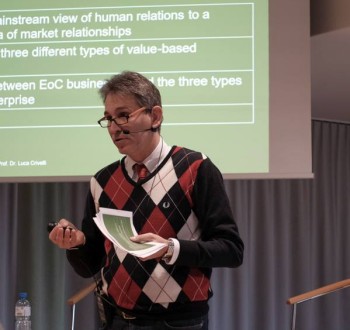 These were three days of intense communion, and among the speeches were those of Luca Crivella, a Swiss economist, who gave interesting cues on the EoC, 25 years after its constitution; and Anouk Grevin, Professor of the Nantes University and Sophia University Institute, who spoke about “giving and corporate gratuity, focusing on the ability to “see” through the eyes of mercy, the gift of the work of one’s own colleagues, ‘acknowledging’ and ‘thanking’ them for the free act which no one can buy. He further said that the eyes of mercy are able to place each person in the disposition to give the best of himself, because he feels the other’s trust and is thus able to express himself without fear of making mistakes.” Herbert Lauenroth, an expert in interculture at the Ecumenical Centre of Ottmaring (Augsburg), spoke about mercy applied to economic and political lives. It was the first EoC meeting for a businessman from England, who said: “One thing which you have and can donate to those who fight for a better world, but who may not see the light, is your joy. It is something incredible! A real spiritual capital!.”». And Peter, a youth from Serbia said: «I came, thinking that it would be a waste of time. But I found people who are open, and every dialogue was important for me. I shall take away with me the great benefits of this event.»
These were three days of intense communion, and among the speeches were those of Luca Crivella, a Swiss economist, who gave interesting cues on the EoC, 25 years after its constitution; and Anouk Grevin, Professor of the Nantes University and Sophia University Institute, who spoke about “giving and corporate gratuity, focusing on the ability to “see” through the eyes of mercy, the gift of the work of one’s own colleagues, ‘acknowledging’ and ‘thanking’ them for the free act which no one can buy. He further said that the eyes of mercy are able to place each person in the disposition to give the best of himself, because he feels the other’s trust and is thus able to express himself without fear of making mistakes.” Herbert Lauenroth, an expert in interculture at the Ecumenical Centre of Ottmaring (Augsburg), spoke about mercy applied to economic and political lives. It was the first EoC meeting for a businessman from England, who said: “One thing which you have and can donate to those who fight for a better world, but who may not see the light, is your joy. It is something incredible! A real spiritual capital!.”». And Peter, a youth from Serbia said: «I came, thinking that it would be a waste of time. But I found people who are open, and every dialogue was important for me. I shall take away with me the great benefits of this event.»  Prof. Luigino Bruni, world coordinator of the EoC project, recalled the times when Chiara Lubich in Trent with the first group of focolarine, would invite the poor to dine in their house, and would “use the best table cloth and cutlery they had”, and underlined that “our first way of treating poverty, even before giving our profits, is to bring it into our house and into our factories, and love it with ‘beautiful gestures’.” Another challenge targeted “in order to reach the 50th EoC anniversary in a proactive condition,” regards the businesses. “All can see that communion in our companies have to find new and more visible and radical expressions,” he affirmed ,”involving “governance” and above all, property rights. Up to now we have focused on the culture and motivations of the entrepreneurs, but it is ever more evident in an economy of great changes, that the businesses and entrepreneurs do not always coincide.” He also added: “Over the last years, one of the strengths of the EoC along with its resilience is that it has breathed with its entire body. There have not been single persons guiding it, but many active members. The EoC is strong when every worker in the company has the same energy.” In conclusion, Bruni said: “We have become aware that EoC in Europe is still alive after 25 years, and continues to bear fruit and develop in new settings and regions. An important fact is the presence of the first businesses in Russia, and the new business-incubator in Portugal: that Europe we all dream of, from the Atlantic to the Ural mountains. Moreover, it is a youthful and open EoC (many EoC leaders do not come from the Focolare Movement), with the great desire to work for the future.” Photos on Flickr: Photo gallery The next event is set for 2017 in Belgium.
Prof. Luigino Bruni, world coordinator of the EoC project, recalled the times when Chiara Lubich in Trent with the first group of focolarine, would invite the poor to dine in their house, and would “use the best table cloth and cutlery they had”, and underlined that “our first way of treating poverty, even before giving our profits, is to bring it into our house and into our factories, and love it with ‘beautiful gestures’.” Another challenge targeted “in order to reach the 50th EoC anniversary in a proactive condition,” regards the businesses. “All can see that communion in our companies have to find new and more visible and radical expressions,” he affirmed ,”involving “governance” and above all, property rights. Up to now we have focused on the culture and motivations of the entrepreneurs, but it is ever more evident in an economy of great changes, that the businesses and entrepreneurs do not always coincide.” He also added: “Over the last years, one of the strengths of the EoC along with its resilience is that it has breathed with its entire body. There have not been single persons guiding it, but many active members. The EoC is strong when every worker in the company has the same energy.” In conclusion, Bruni said: “We have become aware that EoC in Europe is still alive after 25 years, and continues to bear fruit and develop in new settings and regions. An important fact is the presence of the first businesses in Russia, and the new business-incubator in Portugal: that Europe we all dream of, from the Atlantic to the Ural mountains. Moreover, it is a youthful and open EoC (many EoC leaders do not come from the Focolare Movement), with the great desire to work for the future.” Photos on Flickr: Photo gallery The next event is set for 2017 in Belgium.

 “I learned to be open and not to sweep the dust under the rug,” remarked one seminarians who had attended the workshop on group dynamics based on the Focolare’s spirituality of unity. “I realized that I have to think positive in all that I do,” said another one with great enthusiasm. The spirit of these young men is striking. It is also surprising that in India – a land with thousands of rites and divinities, a land of Hinduism and Buddhism – there should a Catholic seminary with so many young men. The Focolare’s relationship with the Pontifical Seminary of India goes back to 1980. Since then, focolarini on various occasions have been invited to present their spirituality to the seminarians. Many of those seminarians who moved on to become priests and bishops continued to promote the communitarian dimension of the Christian message, which is not always easy to do in their pastoral ministry. In 2016 they asked the Movement for a three-day workshop on group dynamics. It was the first time that the focolarini in Mumbai were faced with such a project, but they accepted the challenge. With a team of 12 men, women, experts from the fields of psychology and relationship, they got to work at putting together a programme for seminarians. It was a demanding task, because of the diversity of cultures among the seminarians who came from all over India, and also because of their different courses of study: from high school to philosophy and theology. The goal of the workshop was to provide the seminarians the tools they could use to help create a community. They had been asked to draw on those elements of Focolare spirituality that have to do with interpersonal relationships: “making ourselves one” with the other; deep listening; the pact of mutual love; sharing experiences of living the Word; giving priority to relationships. These tools were presented from the point of view of psychology and interpersonal relationships through a mixture of brief reports, roll play, testimonies of lay people and clergy and applying the tools to their own lives.
“I learned to be open and not to sweep the dust under the rug,” remarked one seminarians who had attended the workshop on group dynamics based on the Focolare’s spirituality of unity. “I realized that I have to think positive in all that I do,” said another one with great enthusiasm. The spirit of these young men is striking. It is also surprising that in India – a land with thousands of rites and divinities, a land of Hinduism and Buddhism – there should a Catholic seminary with so many young men. The Focolare’s relationship with the Pontifical Seminary of India goes back to 1980. Since then, focolarini on various occasions have been invited to present their spirituality to the seminarians. Many of those seminarians who moved on to become priests and bishops continued to promote the communitarian dimension of the Christian message, which is not always easy to do in their pastoral ministry. In 2016 they asked the Movement for a three-day workshop on group dynamics. It was the first time that the focolarini in Mumbai were faced with such a project, but they accepted the challenge. With a team of 12 men, women, experts from the fields of psychology and relationship, they got to work at putting together a programme for seminarians. It was a demanding task, because of the diversity of cultures among the seminarians who came from all over India, and also because of their different courses of study: from high school to philosophy and theology. The goal of the workshop was to provide the seminarians the tools they could use to help create a community. They had been asked to draw on those elements of Focolare spirituality that have to do with interpersonal relationships: “making ourselves one” with the other; deep listening; the pact of mutual love; sharing experiences of living the Word; giving priority to relationships. These tools were presented from the point of view of psychology and interpersonal relationships through a mixture of brief reports, roll play, testimonies of lay people and clergy and applying the tools to their own lives.  Right from the start the workshop was enthusiastically received and supported by the lively participation, which helped to make the passage from “me to us” that the young men were trying to make. Such a process will be very useful to them when they return to work in groups, and when they will be called upon to start up and conduct groups of other people. It will enable them to put into practice that culture of encounter that is so underscored by Pope Francis. Father George called the workshop “an authentic experience of God among the people.” The intuition to translate the spirituality into life, and the ideas into daily life, turned out to be a winning idea. This is confirmed by the abundant feedback that was written by the participants: “I can everything, but under one condition: that I’m always attentive to the others.” “The encouragement to put the Gospel into practice and not only study it, provoked a radical change in my life.” “This workshop has turned out to be a springboard for my vocation and my way of interacting. The other people’s stories were a great lesson for me.” “It was an extremely fruitful experience of training in being communion. New paths have opened before us. It’s a grace to be able to offer the spirituality of unity in the current social context.”
Right from the start the workshop was enthusiastically received and supported by the lively participation, which helped to make the passage from “me to us” that the young men were trying to make. Such a process will be very useful to them when they return to work in groups, and when they will be called upon to start up and conduct groups of other people. It will enable them to put into practice that culture of encounter that is so underscored by Pope Francis. Father George called the workshop “an authentic experience of God among the people.” The intuition to translate the spirituality into life, and the ideas into daily life, turned out to be a winning idea. This is confirmed by the abundant feedback that was written by the participants: “I can everything, but under one condition: that I’m always attentive to the others.” “The encouragement to put the Gospel into practice and not only study it, provoked a radical change in my life.” “This workshop has turned out to be a springboard for my vocation and my way of interacting. The other people’s stories were a great lesson for me.” “It was an extremely fruitful experience of training in being communion. New paths have opened before us. It’s a grace to be able to offer the spirituality of unity in the current social context.”

 «In a world where globalisation dictates its laws, one of the most important paradoxes we are encountering is that the voice of the southern end of the world is being ignored. Though rich in natural resources like diamonds, gold, oil and other precious minerals, Africa faces: growing poverty and underdevelopment, the worst life expectancy, and a high level of illiteracy, despite the millions of dollars in western aid deposited along the years in various projects. Why? The dramatic response is not only the war we have to suffer, or diseases, but especially corruption which in Africa has become a normal and accepted fact, tearing the continent apart. It is a continent in which the poor have to be corrupt in order to survive, get treated in hospitals, enter one of the “best” professional schools, obtain jobs and get out of jail. Not even the laws are able to eradicate this evil. In most African countries, the law is of western origin, with some nuances taken from local cultures. Protection of the individual alone, for as much as is universally accepted, goes against the principle of the community, most dear to African traditions and that underline the importance of solidarity. The individual is such only if he belongs to a community and acts in function of the community. It is the principle of the “Ubuntu”: I exist because we exist. In the African culture, the
«In a world where globalisation dictates its laws, one of the most important paradoxes we are encountering is that the voice of the southern end of the world is being ignored. Though rich in natural resources like diamonds, gold, oil and other precious minerals, Africa faces: growing poverty and underdevelopment, the worst life expectancy, and a high level of illiteracy, despite the millions of dollars in western aid deposited along the years in various projects. Why? The dramatic response is not only the war we have to suffer, or diseases, but especially corruption which in Africa has become a normal and accepted fact, tearing the continent apart. It is a continent in which the poor have to be corrupt in order to survive, get treated in hospitals, enter one of the “best” professional schools, obtain jobs and get out of jail. Not even the laws are able to eradicate this evil. In most African countries, the law is of western origin, with some nuances taken from local cultures. Protection of the individual alone, for as much as is universally accepted, goes against the principle of the community, most dear to African traditions and that underline the importance of solidarity. The individual is such only if he belongs to a community and acts in function of the community. It is the principle of the “Ubuntu”: I exist because we exist. In the African culture, the 








 “A Church of the poor means two things mainly: the Church should be poor as Christ was poor, if it wants to proclaim the kingdom of God, if it wants its message to be effective. And all Christians who share in the life of the Church should be poor in spirit. Then the message of salvation would be more easily accepted by the poor; whereas, for the rich it will be difficult to enter the kingdom of Heaven than for a camel to go through the eye of a needle…. This Church of and for the poor should not make us imagine any similar socio-political version of it for the world. (…) When Jesus speaks of the poor, he means those who are being tested, who are humble, who are deprived of reassurance and beyond any real support that they can depend on – yet, they turn to God their just benefactor. The Greek translators of the Bible understood that the poverty of these poor was not merely material deprivation; in fact, they did not translate the Hebrew word anaw (poor), as ‘pauper’ or ‘destitute’ but preferred to use the word praus, which evokes meekness and resignation in the midst of hardship and trial.
“A Church of the poor means two things mainly: the Church should be poor as Christ was poor, if it wants to proclaim the kingdom of God, if it wants its message to be effective. And all Christians who share in the life of the Church should be poor in spirit. Then the message of salvation would be more easily accepted by the poor; whereas, for the rich it will be difficult to enter the kingdom of Heaven than for a camel to go through the eye of a needle…. This Church of and for the poor should not make us imagine any similar socio-political version of it for the world. (…) When Jesus speaks of the poor, he means those who are being tested, who are humble, who are deprived of reassurance and beyond any real support that they can depend on – yet, they turn to God their just benefactor. The Greek translators of the Bible understood that the poverty of these poor was not merely material deprivation; in fact, they did not translate the Hebrew word anaw (poor), as ‘pauper’ or ‘destitute’ but preferred to use the word praus, which evokes meekness and resignation in the midst of hardship and trial. 

 The intense three-day event of communion was attended by about 100 participants from 14 European countries (from
The intense three-day event of communion was attended by about 100 participants from 14 European countries (from  These were three days of intense communion, and among the speeches were those of Luca Crivella, a Swiss economist, who gave interesting cues on the EoC, 25 years after its constitution; and Anouk Grevin, Professor of the Nantes University and Sophia University Institute, who spoke about “giving and corporate gratuity, focusing on the ability to “see” through the eyes of mercy, the gift of the work of one’s own colleagues, ‘acknowledging’ and ‘thanking’ them for the free act which no one can buy. He further said that the eyes of mercy are able to place each person in the disposition to give the best of himself, because he feels the other’s trust and is thus able to express himself without fear of making mistakes.” Herbert Lauenroth, an expert in interculture at the Ecumenical Centre of Ottmaring (Augsburg), spoke about mercy applied to economic and political lives. It was the first EoC meeting for a businessman from England, who said: “One thing which you have and can donate to those who fight for a better world, but who may not see the light, is your joy. It is something incredible! A real spiritual capital!.”». And Peter, a youth from Serbia said: «I came, thinking that it would be a waste of time. But I found people who are open, and every dialogue was important for me. I shall take away with me the great benefits of this event.»
These were three days of intense communion, and among the speeches were those of Luca Crivella, a Swiss economist, who gave interesting cues on the EoC, 25 years after its constitution; and Anouk Grevin, Professor of the Nantes University and Sophia University Institute, who spoke about “giving and corporate gratuity, focusing on the ability to “see” through the eyes of mercy, the gift of the work of one’s own colleagues, ‘acknowledging’ and ‘thanking’ them for the free act which no one can buy. He further said that the eyes of mercy are able to place each person in the disposition to give the best of himself, because he feels the other’s trust and is thus able to express himself without fear of making mistakes.” Herbert Lauenroth, an expert in interculture at the Ecumenical Centre of Ottmaring (Augsburg), spoke about mercy applied to economic and political lives. It was the first EoC meeting for a businessman from England, who said: “One thing which you have and can donate to those who fight for a better world, but who may not see the light, is your joy. It is something incredible! A real spiritual capital!.”». And Peter, a youth from Serbia said: «I came, thinking that it would be a waste of time. But I found people who are open, and every dialogue was important for me. I shall take away with me the great benefits of this event.»